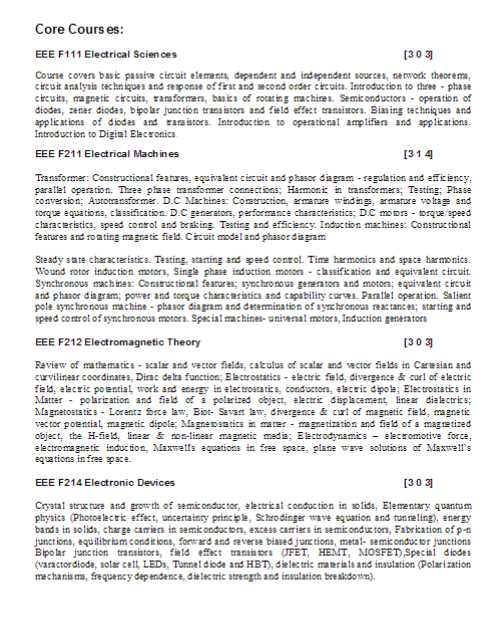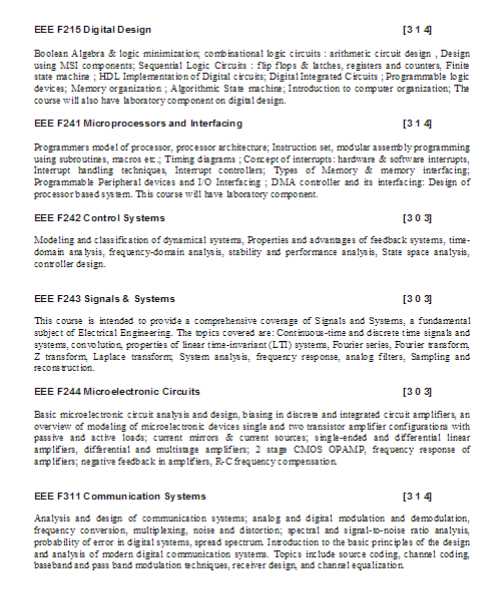|
#2
10th July 2017, 11:24 AM
| |||
| |||
| Re: EEE BITS Pilani
As you want description of B.E.(Hons.-EEE) Electrical and Electronics Engineering Course offered by BITS Pilani, so here is complete course description: BITS Pilani B.E.(Hons.-EEE) Electrical and Electronics Engineering Course Description Core Courses: EEE F111 Electrical Sciences [3 0 3] Course covers basic passive circuit elements, dependent and independent sources, network theorems, circuit analysis techniques and response of first and second order circuits. Introduction to three-phase circuits, magnetic circuits, transformers, basics of rotating machines. Semiconductors-operation of diodes, zener diodes, bipolar junction transistors and field effect transistors. Biasing techniques and applications of diodes and transistors. Introduction to operational amplifiers and applications. Introduction to Digital Electronics. EEE F211 Electrical Machines [3 1 4] Transformer: Constructional features, equivalent circuit and phasor diagram-regulation and efficiency, parallel operation. Three phase transformer connections; Harmonic in transformers; Testing; Phase conversion; Autotransformer. D.C Machines: Construction, armature windings, armature voltage and torque equations, classification. D.C generators, performance characteristics; D.C motors-torque/speed characteristics, speed control and braking. Testing and efficiency. Induction machines: Constructional features and rotating magnetic field. Circuit model and phasor diagram Steady state characteristics. Testing, starting and speed control. Time harmonics and space harmonics. Wound rotor induction motors, Single phase induction motors-classification and equivalent circuit. Synchronous machines: Constructional features; synchronous generators and motors; equivalent circuit and phasor diagram; power and torque characteristics and capability curves. Parallel operation. Salient pole synchronous machine-phasor diagram and determination of synchronous reactances; starting and speed control of synchronous motors. Special machines-universal motors, Induction generators EEE F212 Electromagnetic Theory [3 0 3] Review of mathematics-scalar and vector fields, calculus of scalar and vector fields in Cartesian and curvilinear coordinates, Dirac delta function; Electrostatics-electric field, divergence & curl of electric field, electric potential, work and energy in electrostatics, conductors, electric dipole; Electrostatics in Matter-polarization and field of a polarized object, electric displacement, linear dielectrics; Magnetostatics-Lorentz force law, Biot-Savart law, divergence & curl of magnetic field, magnetic vector potential, magnetic dipole; Magnetostatics in matter-magnetization and field of a magnetized object, the H-field, linear & non-linear magnetic media; Electrodynamics-electromotive force, electromagnetic induction, Maxwell's equations in free space, plane wave solutions of Maxwell’s equations in free space. EEE F214 Electronic Devices [3 0 3] Crystal structure and growth of semiconductor, electrical conduction in solids, Elementary quantum physics (Photoelectric effect, uncertainty principle, Schrodinger wave equation and tunneling), energy bands in solids, charge carriers in semiconductors, excess carriers in semiconductors, Fabrication of p-n junctions, equilibrium conditions, forward and reverse biased junctions, metal-semiconductor junctions Bipolar junction transistors, field effect transistors (JFET, HEMT, MOSFET),Special diodes (varactordiode, solar cell, LEDs, Tunnel diode and HBT), dielectric materials and insulation (Polarization mechanisms, frequency dependence, dielectric strength and insulation breakdown) EEE F215 Digital Design [3 1 4] Boolean Algebra & logic minimization; combinational logic circuits : arithmetic circuit design , Design using MSI components; Sequential Logic Circuits : flip flops & latches, registers and counters, Finite state machine ; HDL Implementation of Digital circuits; Digital Integrated Circuits ; Programmable logic devices; Memory organization ; Algorithmic State machine; Introduction to computer organization; The course will also have laboratory component on digital design. EEE F241 Microprocessors and Interfacing [3 1 4] Programmers model of processor, processor architecture; Instruction set, modular assembly programming using subroutines, macros etc.; Timing diagrams ; Concept of interrupts: hardware & software interrupts, Interrupt handling techniques, Interrupt controllers; Types of Memory & memory interfacing; Programmable Peripheral devices and I/O Interfacing ; DMA controller and its interfacing: Design of processor based system. This course will have laboratory component. EEE F242 Control Systems [3 0 3] Modeling and classification of dynamical systems, Properties and advantages of feedback systems, time domain analysis, frequency-domain analysis, stability and performance analysis, State space analysis, controller design. EEE F243 Signals & Systems [3 0 3] This course is intended to provide a comprehensive coverage of Signals and Systems, a fundamental subject of Electrical Engineering. The topics covered are: Continuous-time and discrete time signals and systems, convolution, properties of linear time-invariant (LTI) systems, Fourier series, Fourier transform, Z transform, Laplace transform; System analysis, frequency response, analog filters, Sampling and Reconstruction BITS Pilani B.E.(Hons.-EEE) Electrical and Electronics Engineering Course Description   Last edited by Rajkumar Agarwal; 10th July 2017 at 11:53 AM. |